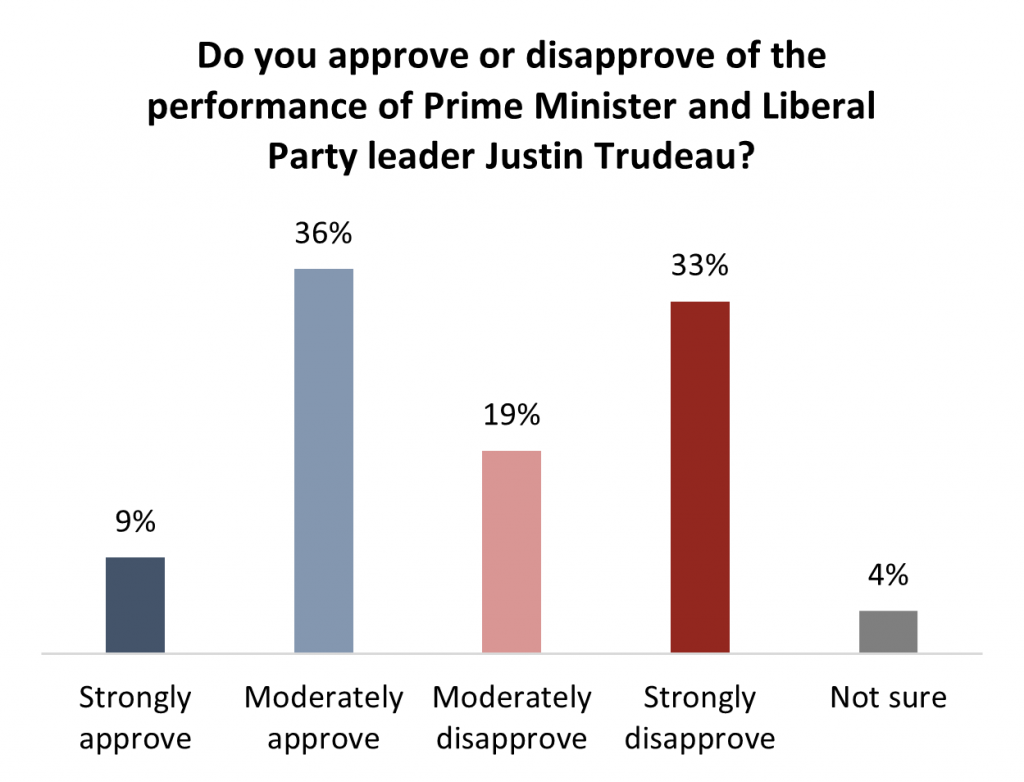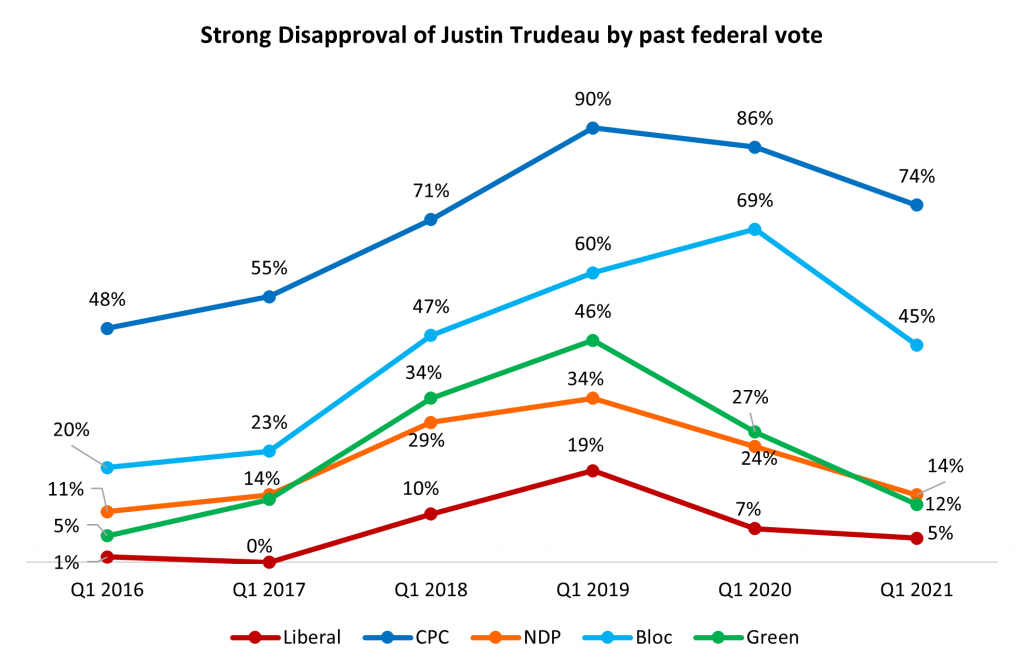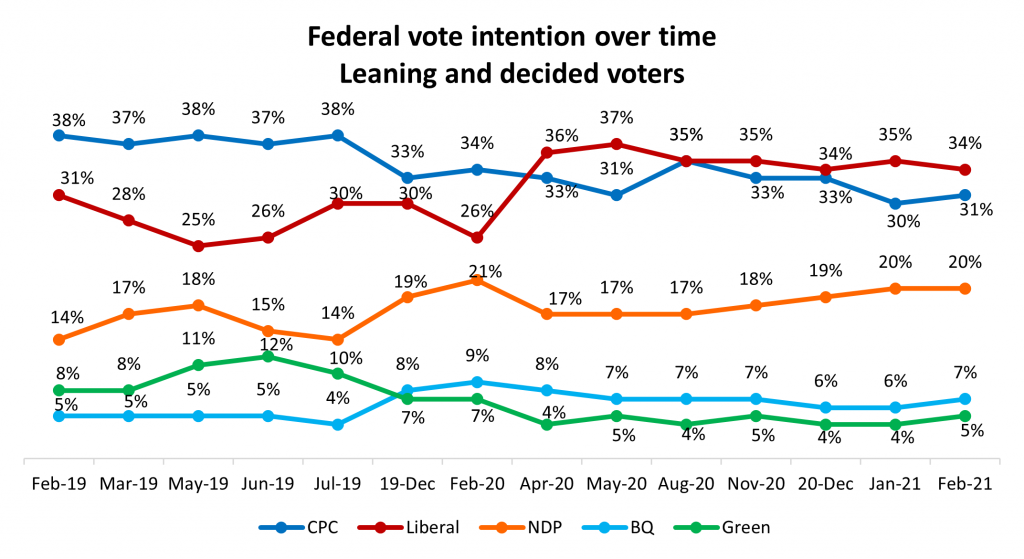Federal Politics: Trudeau approval sinks over vaccination rollout delays, but national political picture remains static

Liberal Party holds a three-point advantage in vote intent over opposition CPC
February 22, 2021 – Criticism, uncertainty and delays have beset Canada’s COVID-19 vaccine rollout and bedevilled the Trudeau government since the beginning of the year. Now, new data from the non-profit Angus Reid Institute sees these factors also suppressing positive views of the prime minister.
Justin Trudeau’s personal approval has dropped five points from where it stood in both December and January, suggesting that the fallout from vaccination delays has hurt his standing. Indeed, a majority of Canadians say the Liberal government had done a poor job of securing doses. Canadians now largely view him with either moderate approval (36%) or strong disapproval (33%).
But while vaccination woes have had a dragging effect on how Canadians view the prime minister personally, the federal political picture is statistically unchanged since last month. The latest vote intent data show a narrowing between the Liberal and Conservative parties from a five-point gap to three points – with the incumbents down by a point, and the main challenger up a point. The NDP continues a slight but gradual climb in vote intention to 20 per cent.
Further, no one opposition party or respective leader appears to be poised – at the moment – to break through among the Canadian electorate. Conservative Party leader Erin O’Toole has seen his own favourability among Canadians decline again in the last month. And while NDP leader Jagmeet Singh continues to be viewed more favourably than other party leaders, it remains to be seen whether his party can meaningfully climb above the 20 per cent mark.
The Angus Reid Institute’s polling shows the Liberals have managed to climb out of political ditches in the past. One key determinant in the coming months will be whether a long-promised arrival of significant vaccine supply enables the Trudeau government to emerge from this period without major damage to its electoral prospects.
More Key Findings:
- The Conservative Party leads over the Liberals in western provinces British Columbia (+3), Alberta (+27), Saskatchewan (+47), and Manitoba (+14). The Liberal Party leads in Ontario (+11), Quebec (+14), and Atlantic Canada (+24).
- Trudeau’s strong disapproval numbers are driven by past CPC voters, three-quarters of whom view him this way (74%). Only 21 per cent of past Liberal voters strongly approve of the PM.
About ARI
The Angus Reid Institute (ARI) was founded in October 2014 by pollster and sociologist, Dr. Angus Reid. ARI is a national, not-for-profit, non-partisan public opinion research foundation established to advance education by commissioning, conducting and disseminating to the public accessible and impartial statistical data, research and policy analysis on economics, political science, philanthropy, public administration, domestic and international affairs and other socio-economic issues of importance to Canada and its world.
INDEX:
-
Top Issues
-
Trudeau approval
-
Cross-party breakdown of approval
-
-
Federal leader favourability
-
Vote intention
-
Regional breakdown
-
Age and gender
-
Top Issues
Nearly one year into the COVID-19 pandemic, this health, economic and social crisis continues to dominate the priority list for Canadians. Health care, climate change and the economy follow, with little change over the past month as restrictions and challenges continue to consume much of Canadians’ available mental bandwidth.

Trudeau Approval
For Prime Minister Justin Trudeau, 2021 has been a year thus far dominated by one question: when will Canadians be vaccinated?
The rollout has had elements of early success, followed by failure. Canada had contracts in place for more doses per citizen than any other country. Delivery, however, has not met expectations. Both manufacturers supplying doses for Canada’s first phase of inoculation – Pfizer and Moderna – have had production delays that meant reduced (or zero) delivery over recent weeks.
Related: Most view Canada’s vaccine rollout relative to other nations as a “failure”
While Trudeau continues to insist Canadian who wants to be vaccinated will have the opportunity to do so by September, few Canadians are confident at this point this pledge will be met. It has had a notable impact on how they view the prime minister. Currently, a majority of Canadians disapprove of Trudeau for the first time since last September:

One of the most significant challenges Trudeau faces from a public opinion perspective is to overcome the opinions of those Canadians who hold intensely negative views toward him. Canadians are nearly four times as likely to strongly disapprove (33%) of Trudeau than to strongly approve (9%), a trend the often-embattled politician has faced before:

Cross-party breakdown of approval
Partisan views of Trudeau have in some ways softened during the COVID-19 outbreak. Strong disapproval of him has dropped among all federal party supporters over the past two years. As seen in the graph below, the Prime Minister generates very strong negative opinions among past CPC and Bloc Quebecois voters; this is less the case with past supporters of other parties:

That said, Trudeau has made no gains in strong approval, leaving him in a position where the majority of the country views him moderately, whether one way or the other:

Federal leader favourability
While approval of Trudeau now falls below majority level, his main political rival, Conservative Party and opposition leader Erin O’Toole, also continues to sink slightly. O’Toole has held the position for less than a year but has yet to endear himself to many Canadians. His favourability rating continues to fall while his unfavourability continues to rise. Half of Canadians now say they view him in a negative light:

Jagmeet Singh fares best in the country from a public opinion perspective, bolstered by near unanimous support among past NDP supporters (see detailed tables). Half of Canadians (48%) view him positively, the best mark of all major federal party leaders. For Green Party leader Annamie Paul, lack of awareness continues to be a problem. Half say they have no opinion of her.

O’Toole’s lack of positive connection with potential voters is best demonstrated by looking at net favourability: he sits at negative 22, a fall of seven points from just over a month ago, while Singh remains at plus eight.

Vote intention
Canadians recently told the Angus Reid Institute that they would be mostly comfortable voting in a federal election during the pandemic. Recent speculation suggests that they may get the chance. Asked how they would vote if an election were held the day they were canvassed, 34 per cent of Canadians say they’d support the Liberal Party, while 31 per cent would cast their ballot in support of the CPC and 20 per cent for the NDP.

The Liberal Party’s fortunes have fluctuated between slight leads and, at one point, a tie against its main challenger, the CPC. Meanwhile, the NDP has seen its vote support base increase ever so slightly over the past year, but the party has been unable to surpass the one-in-five mark:

Regionally, the head-to-head competition between the Liberals and Conservatives is reasonably divided between the east and west. The Liberals garner the largest share of vote intent in Ontario, Quebec, and Atlantic Canada, while the Conservatives lead in B.C., Alberta, Saskatchewan, and Manitoba. The NDP performs best in British Columbia and Manitoba.

Women of all age groups continue show preference for the Liberal Party over the CPC, though this trend is particularly apparent among women ages 55 and older, among whom the Liberals’ advantage rises to 22 percentage points. In comparison, the advantage the Conservative Party holds among men is significantly lower.

For detailed results by age, gender, region, education, and other demographics, click here.
To read the full report, including detailed tables and methodology, click here.
To read the questionnaire, click here.
MEDIA CONTACTS:
Shachi Kurl, President: 1.604.908.1693 shachi.kurl@angusreid.org @shachikurl
Dave Korzinski, Research Director: 250.899.0821 dave.korzinski@angusreid.org

